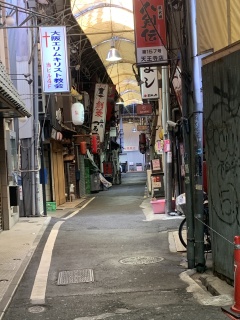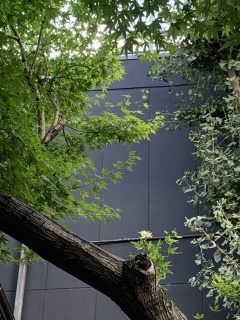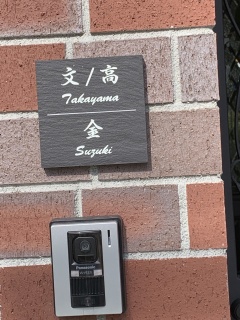Entry tags:
it was always a work in practice
· I’ve been visiting the local Korean markets for oksusu suyom cha, um…cornsilk tea? Very strong flavor, very delicious, very nostalgically Korean.
· In other fall food news, it’s the time of year when applesauce is good: i.e., buy the tartest apples I can find, chop them roughly without peeling, dump in a pot with some lemon juice, simmer (stirring and bashing occasionally) until even in texture, serve hot with cream and cinnamon. Mm. Also Y came home the other day saying “Someone at work gave me some homegrown potatoes!” Excellent, I said, give it here and I’ll fry them up with some onion. The dirt came off under water to reveal purple skins: sweet potatoes. Change of plans… (They were very good, if very sinful, fried in butter with salt.)
· Relatedly, my mother quoted me something from the psychologist Virginia Valien (Valian?), along the lines of “…how she contrasted her way of cooking with her way of writing. With cooking, it was always a work in practice. Too salty this time? Next time she’d use less salt. Next time she’d try some additional or alternative ingredient. She didn’t decide each time: oh, this didn’t turn out so well, so I’m a terrible cook. This didn’t turn out so well, it must be a terrible recipe, and I’ll never make it again.” (I think my brain works the opposite way! I rarely lose my nerve/interest with regard to writing, but messing up a recipe sure is demoralizing.)
· Listening rather obsessively to the opera Peter Grimes; I’m not usually much of a Britten fan, but this one has me. What he does with motifs—“I’ll marry Ellen!” “Grimes is at his exercises,” and so on—and ensemble singing in particular is fantastic. I wish I were still a musicology student, I’d love to spend a semester in a seminar on this one opera. (I’ve listened to a handful of different versions on YouTube and lost track of which one is which; haven’t yet heard an Ellen Orford I REALLY like, her music seems to need a particularly beautiful voice.) Frances Partridge, watching the premiere, loved it and wrote “I often longed to have some interesting, thrilling passage back to listen to it again,” and pace Walter Benjamin, now we can.
· For something completely different, Stevie Wonder’s “Don’t you worry ‘bout a thing”—a favorite of my father’s, and mine too, for its happy energy and its suspensions “when you check it ou-ou-out, when you get o-o-off your trip” and so on.
· The more Chinese I learn the more I don’t know, 越学越不懂; given things like 要不 and 不要 and 要不然 and 不然 and 然而 and 而是 and 就要 and 就是 and, you know, the other million options, I feel like I’m playing with a large box of legos which can be put together in any way and always make something, I just don’t always know what it’s supposed to be, and it’s hard to keep straight which shape and color of legos go together to make the things I want to say. (End of strained metaphor.) Japanese grammar works quite differently—like, ikaseraretakunakereba, a long word meaning “if you don’t want to be made to go,” is made up of dependent parts which can only mean one thing and can only be stuck onto verbs in a given order; there are fewer options, which is much easier to handle! (If I’d learned them in the opposite order I’m sure I’d feel the other way around…).
· Random assortment of photos: Walking across a bridge, a time-travel alley, cosmos (flowers), a stealth cat, ripening persimmons, and so on. Also, I wouldn’t normally post name plates, but this one, from a heavily Korean neighborhood, struck me as sociolinguistically unusual: the Korean names (Moon, Koh, Kim) are in kanji, and the “passing” Japanese names (Takayama, Suzuki) are in romaji. Probably done just for design, but it’s an interesting communication choice. (Suzuki is also an unusual passing name for Kim, whose bearers mostly go by Japanese names with the same character in them, like Kanemoto, Kanayama, Kinjo etc.)









Be safe and well.
· In other fall food news, it’s the time of year when applesauce is good: i.e., buy the tartest apples I can find, chop them roughly without peeling, dump in a pot with some lemon juice, simmer (stirring and bashing occasionally) until even in texture, serve hot with cream and cinnamon. Mm. Also Y came home the other day saying “Someone at work gave me some homegrown potatoes!” Excellent, I said, give it here and I’ll fry them up with some onion. The dirt came off under water to reveal purple skins: sweet potatoes. Change of plans… (They were very good, if very sinful, fried in butter with salt.)
· Relatedly, my mother quoted me something from the psychologist Virginia Valien (Valian?), along the lines of “…how she contrasted her way of cooking with her way of writing. With cooking, it was always a work in practice. Too salty this time? Next time she’d use less salt. Next time she’d try some additional or alternative ingredient. She didn’t decide each time: oh, this didn’t turn out so well, so I’m a terrible cook. This didn’t turn out so well, it must be a terrible recipe, and I’ll never make it again.” (I think my brain works the opposite way! I rarely lose my nerve/interest with regard to writing, but messing up a recipe sure is demoralizing.)
· Listening rather obsessively to the opera Peter Grimes; I’m not usually much of a Britten fan, but this one has me. What he does with motifs—“I’ll marry Ellen!” “Grimes is at his exercises,” and so on—and ensemble singing in particular is fantastic. I wish I were still a musicology student, I’d love to spend a semester in a seminar on this one opera. (I’ve listened to a handful of different versions on YouTube and lost track of which one is which; haven’t yet heard an Ellen Orford I REALLY like, her music seems to need a particularly beautiful voice.) Frances Partridge, watching the premiere, loved it and wrote “I often longed to have some interesting, thrilling passage back to listen to it again,” and pace Walter Benjamin, now we can.
· For something completely different, Stevie Wonder’s “Don’t you worry ‘bout a thing”—a favorite of my father’s, and mine too, for its happy energy and its suspensions “when you check it ou-ou-out, when you get o-o-off your trip” and so on.
· The more Chinese I learn the more I don’t know, 越学越不懂; given things like 要不 and 不要 and 要不然 and 不然 and 然而 and 而是 and 就要 and 就是 and, you know, the other million options, I feel like I’m playing with a large box of legos which can be put together in any way and always make something, I just don’t always know what it’s supposed to be, and it’s hard to keep straight which shape and color of legos go together to make the things I want to say. (End of strained metaphor.) Japanese grammar works quite differently—like, ikaseraretakunakereba, a long word meaning “if you don’t want to be made to go,” is made up of dependent parts which can only mean one thing and can only be stuck onto verbs in a given order; there are fewer options, which is much easier to handle! (If I’d learned them in the opposite order I’m sure I’d feel the other way around…).
· Random assortment of photos: Walking across a bridge, a time-travel alley, cosmos (flowers), a stealth cat, ripening persimmons, and so on. Also, I wouldn’t normally post name plates, but this one, from a heavily Korean neighborhood, struck me as sociolinguistically unusual: the Korean names (Moon, Koh, Kim) are in kanji, and the “passing” Japanese names (Takayama, Suzuki) are in romaji. Probably done just for design, but it’s an interesting communication choice. (Suzuki is also an unusual passing name for Kim, whose bearers mostly go by Japanese names with the same character in them, like Kanemoto, Kanayama, Kinjo etc.)









Be safe and well.

no subject
I learnt Chinese first and found it made learning Japanese tremendously easier, haha. But definitely agree that Chinese vocab is like lego bricks and trying to stick them in the right order is difficult; I struggle with the same
The bit about Korean/Japanese names is interesting! I'd never thought about that- I'd always assumed that a localised reading of the hanja/kanji would be adopted.
(no subject)
(no subject)
(no subject)
no subject
(no subject)
no subject
I am going to see Gloriana in December! I'd never seen a Britten opera in my life until I went to see A Midsummer Night's Dream when I was in Germany in the spring, and now it will be two in the same year.
(no subject)
(no subject)
(no subject)
no subject
I feel the quote about cooking, though, I'm much more *shrugs* if an experiment doesn't turn out in cooking (as long as I'm not cooking for anyone else!) Baking, now that's a different beast... vs writing, I enjoy experimenting with style and form but I get way too serious about posting longfics :')
(no subject)
(no subject)
no subject
Oh, that's the one that leaves your throat all...well, silky?
I love that time travel alley!
(no subject)
(no subject)
(no subject)
no subject
(no subject)
no subject
Oh oh oh that shot of power lines and sky 🧡
I got your postcard and gotta say I love the way your printer generated the image. It looks like a painting!
(no subject)
(no subject)
(no subject)
(no subject)
no subject
(no subject)
no subject
Cooking also feels like a work in progress to me, but that's also because I never settle on a recipe! (I have a terrible habit of making things well the first time and having it be worse the second time, because I just end up going, "well, what if I do the first time but add MORE of what I like", and then it's just too muc hof a good thing.
(If I’d learned them in the opposite order I’m sure I’d feel the other way around…).
Ha, legos is actually exactly how Japanese feels to me! There are all of those verb and adjective blocks to start with, and then I'm jamming other things onto them to modify them and jamming other things onto them, and hoping I picked the right piece that will actually fit, and that it's all going to fit in the foundation I already built for my sentence...
Stealth cat is so stealthy (I really had to zoom in), and persimmons! :D
(no subject)
no subject
I want to try cornsilk tea. A large Korean supermarket recently opened in my area and I will have to check it out. This week I've been drinking Korean citron-honey tea I bought online.
Your applesauce sounds delicious, as do the sweet potatoes.
The more Chinese I learn the more I don’t know
Mood.
(no subject)
no subject
I think that kind of resilience is learned? I'm much more patient with some things than others, depending on the feedback I got... idk, early in life? Or the examples my parents set?
(If I’d learned them in the opposite order I’m sure I’d feel the other way around…)
I'm not sure about that! :D The context sensitivity of Chinese is *extremely challenging*. (I did learn Chinese first, so.)
(I cannot tell all of those conjunctions/prepositions you mentioned apart, either. Too similar. Need waaay more practice.)
· Random assortment of photos
Oh wow those bridges are amazing! And the alley! <3<3<3
I also didn't know about the name thing at all. So people take Japanese names? That's very interesting!
(no subject)
(no subject)
(no subject)
no subject
that sums it up rather nicely, tbh. I'm sitting in front of the legos blinking in befuddlement myself...
(no subject)
(no subject)
no subject
This is what I really love most about Chinese, all the word formation! It feels like I'm getting free extra words for every character I learn. *g*
Also, I wouldn’t normally post name plates, but this one, from a heavily Korean neighborhood, struck me as sociolinguistically unusual: the Korean names (Moon, Koh, Kim) are in kanji, and the “passing” Japanese names (Takayama, Suzuki) are in romaji. Probably done just for design, but it’s an interesting communication choice. (Suzuki is also an unusual passing name for Kim, whose bearers mostly go by Japanese names with the same character in them, like Kanemoto, Kanayama, Kinjo etc.)
This is fascinating, thank you for sharing!
(no subject)